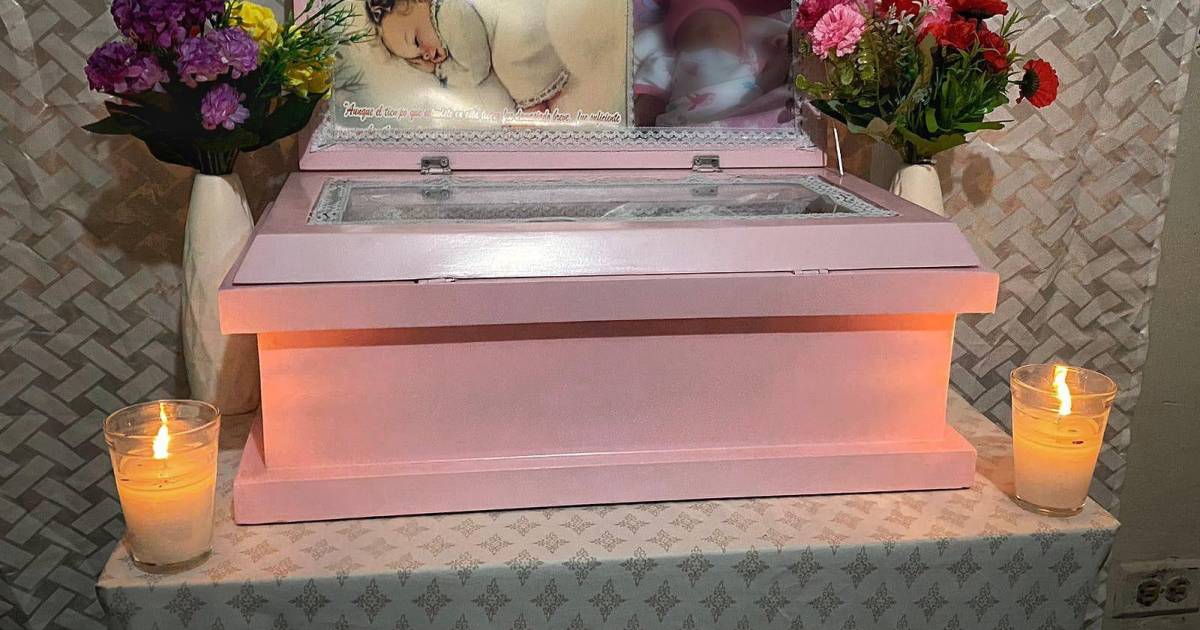Global Courant 2023-05-20 11:20:01
Everything began as gray as if the first warning of a chronicle of a death foretold had arrived. The phrase is iconic and immortalized by a book with that title by the writer Gabriel García Márquez, but it fits well with the tragic story of a Honduran girl whose terminal illness ended her life just four months after she was born.
The young mother of 28 years she spent a grueling 48 hours in labor, something unusual and very different from her two previous deliveries.
Corpulent, approximately 1.30 meters tall, and white skin, she was expecting her third child (with the background that her firstborn had died).
On December 18, 2022, the lazy contractions began, everything indicated that Angélica (fictitious name) was giving the first warnings that the family of three would soon complete.
12 hours of anguish passed and everything continued the same, the contractions were still soft and, from previous experience, the mother knew that it was not yet time to go to the Honduran Institute of Social Security (IHSS).
Second day of waiting. Mom’s instinct told her that it was time to seek medical help, only a mother who has gone through a similar experience or, by the mere fact of giving life, could more easily embody those moments where the minutes seem like hours and the hours seem like days
Monday December 19. A day when the sky was gray, lined with thick clouds as if it coincided with everything that crossed the mind of this anguished mother. For some elderly women in villages who gave birth at home, “giving birth is like coming face to face with death.”
A quarter to 9:00 in the morning, the suitcase was ready as a sign that 24 hours of waiting had passed and the symptoms were mild. After 15 minutes, the patient left one of the apartments that she rents in the Río Blanco neighborhood, in San Pedro Sula, Cortés, in northern Honduras.
“ “I saw that her stomach was big and hard, I took her to the health center and they told me it was gas, three days went by and she didn’t improve.” “
Mirna Beltran, mother
She walked approximately five minutes down a dirt road to board a bus that would take her to the IHSS (her job as a cleaner in a company allows her to enjoy the social security benefit that not all Honduran families have).
Once inside the busy Social Security emergency room, she had to report the situation and then be treated in the maternity ward, a process that if the patient arrives on foot tends to take longer because there are other more urgent cases.
Admission to the labor and delivery room was quick. Nurses and doctors immediately approached her and intervened with an intravenous catheter where little by little the abortive serum (medication that starts or makes contractions stronger) passed.
The afternoon hours of that fateful Monday passed, night fell and the husband was already outside the IHSS, he had just left his workday, he was tired and happy, waiting for his princess who would soon arrive in the world. .
The effect of the abortifacient serum was more intense every hour, it was 11:59 at night and Angelica had already gone down, but it was not time yet, the most awaited moment was about to come true. The mother, with a lot of exhaustion and weakness, according to her story, knew that the wait was about to end.
Tuesday December 20. At 2:45 in the morning, the most awaited gift from his parents and his six-year-old brother came into the world. It was a normal birth and, according to testimonies from other mothers, when they first see their children it is as if they forgot all the suffering.
After delivery
Routine checkups for a newborn indicated that all was well. At 12 noon, ten hours after giving birth, the doctors released her mother and they happily returned to the apartment, a new member of the family was going home in dad’s arms.
The little brother jumped for joy and was very curious to meet his little sister. The first five weeks passed and everything seemed to be progressing very well. Suddenly, after 40 days of birth, the baby cried desperately and complained; Mom’s instinct was that something was wrong.
“I saw that her stomach was big and hard, I took her to the health center and they told me it was gas, three days went by and she didn’t get better, then I went to Social Security,” said Angélica’s mother, still dismayed, remembering those moments of anguish.
The doctors saw that the problem was greater and that she needed emergency care, they began to do endless clinical tests that took five days to give an accurate diagnosis, the worst was yet to come.
“ “(The children) get very sick, restless, they don’t sleep peacefully, they cry and even have convulsions” “
Mirna Beltran, mother
The word cancer only resonated with the parents when they heard the word chemotherapy spoken by the doctor. They would relive what they experienced in 2015 with their firstborn. Same diagnosis, same treatment, despite the fact that the official report was not conclusive, because the signs were similar to histiocytosis (there is no unanimous consensus in the scientific community if it is a type of cancer).
“The same day they gave me the diagnosis, they gave him the first chemotherapy,” the mother told THE PREMIUM PRESS.
What reactions did you see in the girl? asked the journalist. “They get very sick, restless, they don’t sleep peacefully, they cry and even have seizures,” said the mother in a soft and slow tone of voice.
One day after the procedure they went home, the first time she was hospitalized for six days in the IHSS, eight days later she returned to the second chemotherapy of six consecutive cycles.
During that time the parents spent countless bitter moments, according to their stories, with more questions than answers. They were faced with the same diagnosis for the second time: the firstborn died when he was three years old.
The problem was encapsulated in the spleen, it was the size of an adult and everything began to get complicated.
“ “One never prepares for these cases, but when the diagnoses are not encouraging, just a miracle or waiting for whatever happens, it’s painful, as a parent nobody wants to lose a child.” “
Mirna Beltran, mother
A month later, the little girl had to be hospitalized for the second time. She caught the flu, her defenses were down and she convulsed, she spent five days in the IHSS pediatric ward, while her mother fought with a lawyer so that she would not be fired from her job for not showing up after of the maternity period.
In that period, the medical team suggested that he begin procedures to request a passport and look for the possibilities of leaving the country in search of a bone marrow transplant, a procedure that would help resist chemotherapy treatment.
“One never prepares for these cases, but when the diagnoses are not encouraging, just a miracle or waiting for whatever happens, it’s painful, as a parent nobody wants to lose a child.” Those were the words of his father, who remained strong, clinging to faith and God’s mercy to channel his emotions.
On April 4 the countdown began, once again the baby was admitted, the next day she was admitted to the IHSS Intensive Care Unit (ICU), the condition was serious. “The doctor was clear, she told us that the children who entered there did not come out alive, just a miracle from God,” said the mother.
In the ICU room, patients spend without the company of the family, Angélica received a visit from her mother once a day. Every day more bad news arrived, but it was not until April 20 that the girl began to die.
At 12 noon the heart rate monitor indicated that the chances of life were fading little by little, the doctors called the parents and suggested that they carry her in their arms for as long as they wanted, because there was no more to do.
“In some prayers she asked God that if she was not going to live to take her to a better place so that she would not suffer, they belong to God,” said the father, still dismayed and reliving those moments of anguish.
The parents held their daughter for 40 minutes, talked to her as a healing therapy and then returned her to the place where she stayed for 16 days, immediately a doctor turned off the mechanical respirator, the heart monitor was at zero.
On Thursday, April 20, at approximately 5:00 in the afternoon, a light that illuminated the eyes of the family at birth went out forever. The next day, she was transferred to the cool mountains of the municipality of Colomoncagua, department of Intibucá, in a tiny pink coffin.
An eight-hour trip and there the rest of the family was waiting with the grave made two meters deep as is customary in the villages. She already rests for eternity with her older brother who died in 2015.
The mother went to work the third day after what happened and they are paying debts that they incurred during those months of crisis.
If you want to support this family, contact the number 3266-6595.








